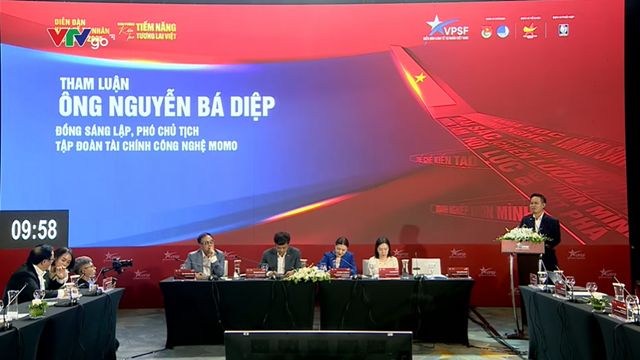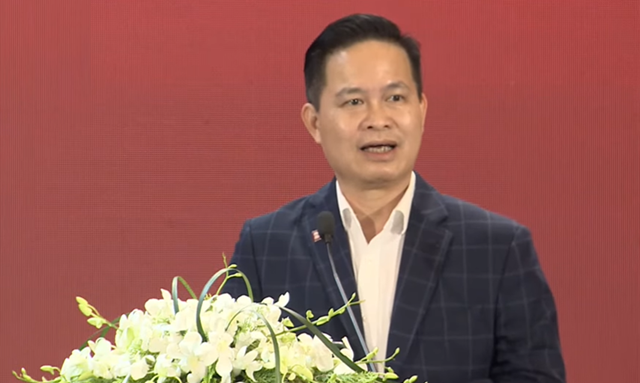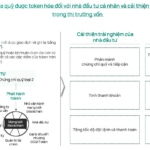This insight was shared by Mr. Nguyen Ba Diep, Co-founder and Vice Chairman of MoMo Technology Financial Group, during the Vietnam Private Economic Forum 2025 on September 15th. His remarks were part of the panel discussion titled “Science, Technology, and Innovation: The Catalyst for Growth.”

Mr. Nguyen Ba Diep, Co-founder and Vice Chairman of MoMo Technology Financial Group, speaking at the forum
|
In his opening remarks, Mr. Diep emphasized that Vietnam’s Fintech sector is on par with global standards, even surpassing the U.S. and Europe in certain aspects.
The core purpose of Fintech is to leverage technology to ensure equal access to financial services for all, particularly underserved populations—a gap traditional banks have yet to bridge.
Statistics reveal that Vietnam has 55 million working-age individuals and approximately 5 million small merchants. However, only 30% of these individuals can access formal bank loans. The primary barriers are the lack of verifiable income and collateral, making it challenging to secure financing.
Here, Fintech can utilize collected data to build creditworthiness models, enabling banks to serve these underserved segments. This is especially crucial for small merchants, helping them digitize their operations and access financial services.
Currently, Vietnam boasts four unicorn companies, all of which are Fintech-related. Fintech encompasses various sectors, with the four most prominent being digital payments/banking, lending/asset management, insurance/compliance, and blockchain/data.

Mr. Nguyen Ba Diep, Co-founder and Vice Chairman of MoMo Technology Financial Group, speaking at the forum
|
To foster Fintech growth, Mr. Diep proposed several key recommendations.
First, a centralized regulatory body for Fintech is essential. Currently, a Fintech company may be overseen by up to five ministries, creating complexity. A single point of contact for digitization and related matters would streamline operations, allowing companies to focus on innovation rather than bureaucratic hurdles.
Countries like South Korea, China, Japan, and the U.S. have demonstrated that a unified regulatory body is critical for supporting science, technology, and Fintech development.
Additionally, digital economies and Fintech thrive on data. While Vietnam has initiated efforts, a more open framework for Open Data and Open APIs is needed to facilitate data sharing among Fintech firms, banks, insurers, and businesses. Non-traditional data sources should also be leveraged.
For instance, in recruitment, companies could use open data to assess a candidate’s creditworthiness instead of traditional investigations. Relevant data sources include health insurance, social insurance contributions, medical records, and e-commerce behavior. More data enables better trend analysis and customer risk assessment.
In banking, interest rates are often uniform across customers. However, with clear risk segmentation, personalized rates could be offered.
Currently, Vietnam’s Fintech sector is primarily focused on basic payment services. As society embraces digital payments, future Fintech innovations could collaborate with banks to create digital banks offering essential services like deposits and small-scale loans.
According to Mr. Diep, combining Fintech’s customer reach with banks’ capital and risk management expertise will enhance financial inclusion for low-income and underserved populations.
Regarding legal frameworks, the Sandbox model has been widely discussed but remains slow due to its multi-layered approval process. A simplified regulation, managed by a single ministry, would expedite experimentation and refinement.
“In a rapidly evolving tech landscape, a three-year Sandbox process followed by a year of licensing could render the technology obsolete,” Mr. Diep cautioned.
Lastly, regarding capital, Fintech companies, as tech firms, require substantial early-stage investment for market penetration and product development. Current regulations mandate profitability and the elimination of accumulated losses before fundraising. Therefore, the government should expedite the implementation of IPO models for tech companies, enabling long-term capital mobilization.
– 5:21 PM, September 16, 2025
Dragon Capital: Vietnam’s Crypto Asset Holdings Estimated at $100 Billion
“Dragon Capital hails Resolution 05/2025 as a pivotal move to propel the digital asset market forward in a rapid and well-directed manner.”
“Strengthening the Strategic Alliance: Sacombank-SBR and EzyRemit”
On August 26, 2025, Sacombank-SBR visited and worked with EzyRemit Worldwide at their representative office in Toronto during their business trip to Canada. The meeting aimed to strengthen the strategic partnership between the two parties and discuss ways to provide fast, secure, and cost-effective international money transfer solutions for the Vietnamese community in Canada.
Unlocking the International Green Finance Market: Opportunities and Challenges for Vietnam
The upcoming international conference, “Unlocking International Green Capital Markets: Fostering Sustainable Development and Inclusive Finance in Vietnam,” is set to take place on September 5, 2025, at the Tea Resort Prenn in the beautiful city of Da Lat.




















